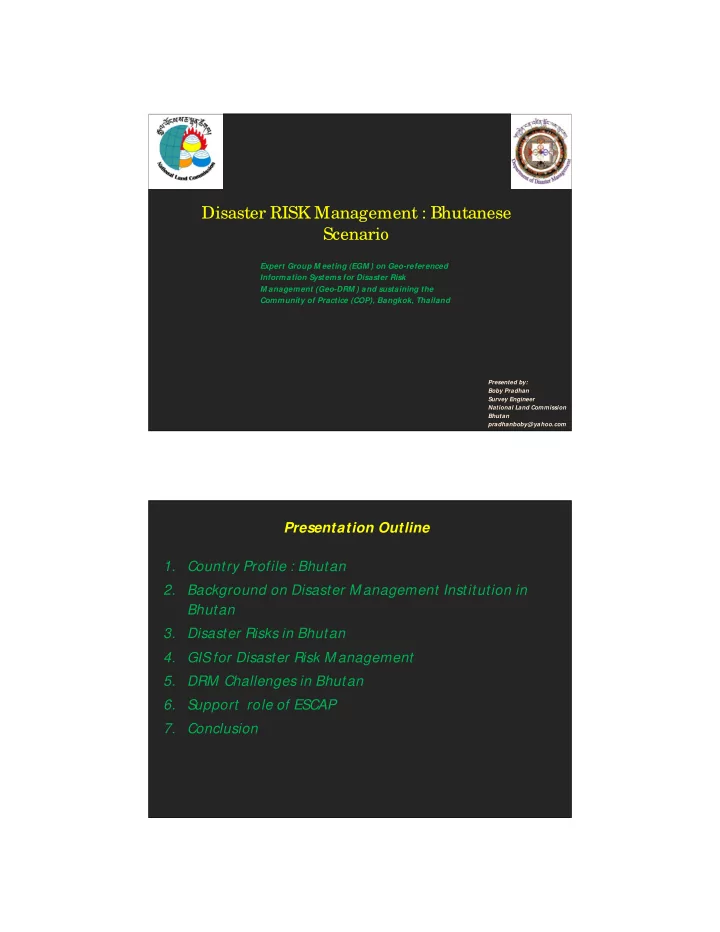

Disaster RISK Management : Bhutanese Scenario Expert Group M eeting (EGM ) on Geo-referenced Information Systems for Disaster Risk M anagement (Geo-DRM ) and sustaining the Community of Practice (COP), Bangkok, Thailand Presented by: Boby Pradhan Survey Engineer National Land Commission Bhutan pradhanboby@yahoo.com Presentation Outline 1. Country Profile : Bhutan 2. Background on Disaster M anagement Institution in Bhutan 3. Disaster Risks in Bhutan 4. GIS for Disaster Risk M anagement 5. DRM Challenges in Bhutan 6. Support role of ESCAP 7. Conclusion
• Small, mountainous, landlocked country in South Asia • located in the eastern Himalayas, bordered by India and China • Government: Constitutional M onarch • Development Philosophy: Gross National Happiness • Size: about 46,000 Sq. Km with 70% forest cover • Population: about 0.7 M illion • Capital City: Thimphu • Altitude : Varies from 150m to 7570m above M SL • National Language : Dzongkha • Climate: Four seasons (Spring, summer, Autumn & Winter)
2. Background on Disaster M anagement Institution • 2005 – establishment of DM Division, M oHCA • 2006 – National Disaster Risk M anagement Framework adopted ; guiding policy for DM • 2007 – Drafting of DM Bill • 2008 – Dept. of Disaster M anagement, M oHCA • 2013 (February) – DM Act enacted Guiding Philosophy of DM Act, 2013 • Pre-planned vs Adhoc reactive approach • M ulti-Agencies vs Single Agency approach • Decentralized vs Centralized approach 2.1 Disaster M anagement Institution organogram (DM Act,2013) National Disaster M anagement Authority Dept. of Disaster M inistries/ Agencies M anagement • Inter M inisterial Task • National Emergency Force Operation Center District Disaster M anagement Committee Village/Block DM Sub District DM Committee Committee M unicipal DM Committee
3. Disaster Risks in Bhutan Earthquake September 21, 2009 Earthquake (M =6.1) Impacts: • Affected 6 eastern districts out of 20 in Bhutan • 12 lives lost • Over 7000 people left without adequate shelter • Estimated loss of over US $54 Million: UNDP/ World Bank Assessment Report Glacial Lake Outburst Flood (GLOF) & M onsoon floods GLOFs: the most serious natural hazard with 25 • lakes, few potentially dangerous. Hazards due to GLOF & monsoon floods are • likely to increase in intensity with the impacts of climate change. Settlements downstream are most vulnerable • Trans boundary issues •
Natural/ artificial Dam formation & dam burst Land slides • Too many HPP : at least one or • more HPP in main rivers Landslide Occurs in summer triggered by • heavy monsoon rain Road maintenance being one of • the largest expenditure to Govt.
Fire Over 20,000 acres of • forest were destroyed this winter Wangdi Dzong • gutted by fire Windstorm/ hail storm private houses & schools in five • districts were destroyed Crops & other vegetation •
Epidemics, Pests, Diseases Army worm attack in 2012 • Frequent bird flu out break • Road Accidents Reckless & drink driving • Poor road & weather conditions • Human error & M echanical • failure
4. GIS for Disaster Risk M anagement Disaster Phases GIS Applications Risk assessment, Identification of evacuation route and Before Disaster shelter, Early warning system , (M itigation & Cost/Benefit relationship to justify measures oriented for Preparedness – Disaster disaster risk reduction, M anagement Plan) During Disaster Damage scenarios to be prepared for emergency (Response & Relief – response, Clear direction for SAR (with GPS), Disaster Contingency Identification of suitable evacuation route & area for plan) rehabilitation After Disaster Damage assessment (based on high resolution satellite (Reconstruction & image) – identify the type & amount of damage, Recovery) Identification of suitable location for reconstruction 5. DRM Challenges in Bhutan • Illiterate population, inadequate awareness • Difficult terrain • Lack of coordination among stake holders • inadequate resources - financial - professionals data redundancy •
6. Support Role of ESCAP • Technical expertise and financial assistance towards building capacity at local level • Share Success stories, international best practices • Regional collaboration towards Strengthening Coordination among Relevant Agencies • Sensitization/ Awareness on the benefits of GIS, Geo- Portal for DRM • Sensitize policy/ decision makers 7. Conclusion Combating disaster is a common responsibility • Preparedness & Planning is a must • Effective Sensitization/ Awareness programs • Collaboration & Capacity development •
Thank you!
Recommend
More recommend